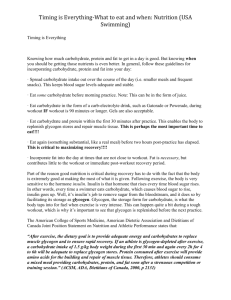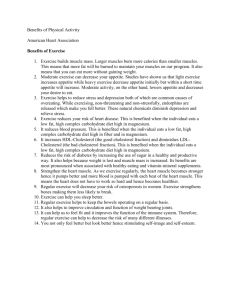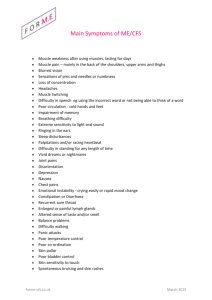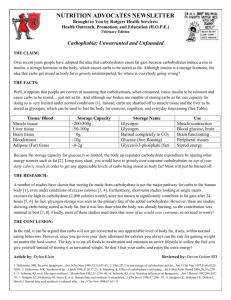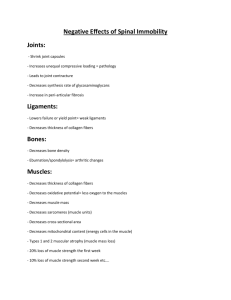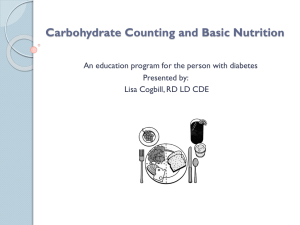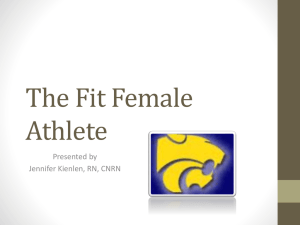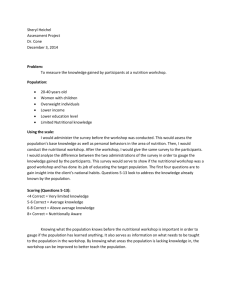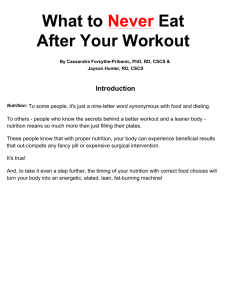Nutrient Timing John Ivy & Robert Portman (2004) Muscle is under a
advertisement
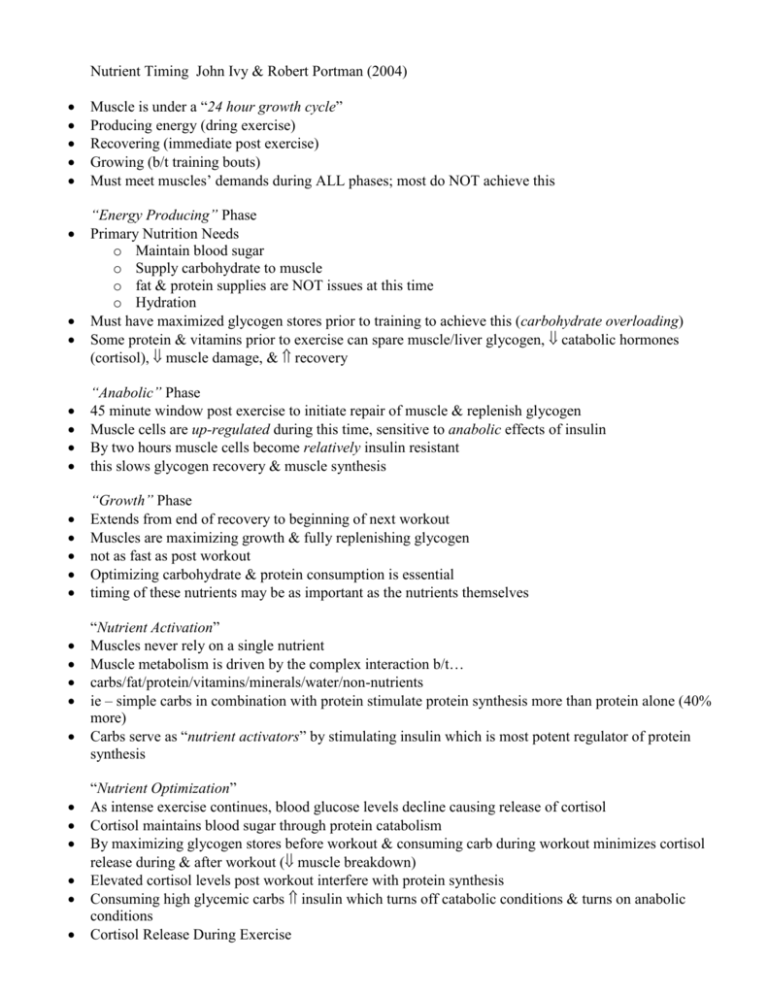
Nutrient Timing John Ivy & Robert Portman (2004) Muscle is under a “24 hour growth cycle” Producing energy (dring exercise) Recovering (immediate post exercise) Growing (b/t training bouts) Must meet muscles’ demands during ALL phases; most do NOT achieve this “Energy Producing” Phase Primary Nutrition Needs o Maintain blood sugar o Supply carbohydrate to muscle o fat & protein supplies are NOT issues at this time o Hydration Must have maximized glycogen stores prior to training to achieve this (carbohydrate overloading) Some protein & vitamins prior to exercise can spare muscle/liver glycogen, catabolic hormones (cortisol), muscle damage, & recovery “Anabolic” Phase 45 minute window post exercise to initiate repair of muscle & replenish glycogen Muscle cells are up-regulated during this time, sensitive to anabolic effects of insulin By two hours muscle cells become relatively insulin resistant this slows glycogen recovery & muscle synthesis “Growth” Phase Extends from end of recovery to beginning of next workout Muscles are maximizing growth & fully replenishing glycogen not as fast as post workout Optimizing carbohydrate & protein consumption is essential timing of these nutrients may be as important as the nutrients themselves “Nutrient Activation” Muscles never rely on a single nutrient Muscle metabolism is driven by the complex interaction b/t… carbs/fat/protein/vitamins/minerals/water/non-nutrients ie – simple carbs in combination with protein stimulate protein synthesis more than protein alone (40% more) Carbs serve as “nutrient activators” by stimulating insulin which is most potent regulator of protein synthesis “Nutrient Optimization” As intense exercise continues, blood glucose levels decline causing release of cortisol Cortisol maintains blood sugar through protein catabolism By maximizing glycogen stores before workout & consuming carb during workout minimizes cortisol release during & after workout ( muscle breakdown) Elevated cortisol levels post workout interfere with protein synthesis Consuming high glycemic carbs insulin which turns off catabolic conditions & turns on anabolic conditions Cortisol Release During Exercise Insulin Functions to move glucose into cells at rest (not needed during exercise) also moves amino acids into cells High levels AT REST fat synthesis & fat oxidation Chronically elevated levels AT REST & associated fat accumulation is associated with Type 2 Diabetes Insulin’s specific function is dependent on body state relative sensitivity of insulin to the fat vs muscle cells muscle cells very sensitive post exercise fat cells very sensitive at rest Summarizing Insulin Effects Stimulates DNA and RNA increasing enzymes responsible for protein synthesis protein synthesis has been shown to increase 67% when elevated post exercise A.A. uptake into muscles cells Not thought of much Insulin ’s rate of A.A. transport into cell by 20-50% ’s protein degradation which occurs during/after exercise Replenishes glycogen stores (via activation of glycogen synthase as much as 70%) Suppresses cortisol, protecting against muscle degradation Nutritional Considerations Pre-During-Post Exercise and Sports Competition Pre-Competition Meal Key Concepts Begins several days prior to competition Sig. loss of carbohydrate stores occurs over night pre-comp meal serves to replenish carbohydrate stores (liver & muscle) (minimize cortisol relaese) serves to hydrate Minimize foods high in fats or protein (day of) slow digestion, need is carbohydrate protein use for energy facilitates dehydration Simple carbs absorbed fastest & prevent feeling of bloating or being full (avoid high fiber) Carbohydrate Overloading Technique used to maximize glycogen content in muscle and liver prior to long duration high intensity events Begins 5 days prior to event Day 1-3: perform intermittent high intensity running -50%) Days 4 & 5: perform either no exercise or short duration low intensity -70%) Event Day: consume pre-event meal Sample Pre-Competition Meal 4 hrs prior to event 1 gram/lb of carbs. (solid & liquid) (4:1 ratio of carbs to protein) ie – 160 lb – 160 grams of carbohydrate needed + water (12 oz) Total cereal (SKIM milk); 1oz lean sausage (meat), banana; 16oz orange juice; glass of water? 150 grams of carbs, 31 grams of protein, 6 grams of fat 1 hour prior .25 gram/lb ie – 160 lb – 40 grams + water (12 oz) 20 oz sports drink 32 grams of carbohydrates, fruit? Within last hour prior is up to athlete ?? definitely water ie – sports drink During Competition Activities of low intensity & lasting <1 hr water intake is fine When intensity is high &/or lasts >1 hr carbohydrates are needed spares carbohydrate stores maintains blood sugar levels (prevents fatigue) spares muscle use for energy (minimizes dehydration/holds on to muscle) 30-60 g of carbs/hr optimal (sports drink best source) glucose absorption rate = 50-80 g/hr. 14 grams/8 oz ideal drink (4-8 oz/15 min) note: this will not offset what you use during exercise it will help though during intense exercise = 240 g/hr Recovery Nutrition Enzymes that control carbohydrate and protein synthesis (building) are very active 1st 2 hours after exercise or sport (maximize effect of Growth Hormone) best time to improve carbohydrate stores & build muscle is right after exercise or practice (need them for tomorrow) Have drink & or fruit available (immediately) .4? grams/lb of carbohydrate each hour for 4 hours after workout Protein intake for recovery .3 grams/lb within 4 hours after workout continue regular carbohydrate and protein consumption for the day 160 lbs = 250 grams of carbohydrates & 48 grams sports drink – 20 oz 32 grams; trail mix (fruit, nuts, seeds, granola) 70 g carbs; 20 g of protein (maybe more protein) 2 cups of spaghetti (sauce with meat); fruit juice; salad (mix of veg, cheese, ranch dressing), 2 slices of bread 1730 calories, 234 grams of carbs, 55 grams of protein 2-3 cups of water (fluid)/lb lost
